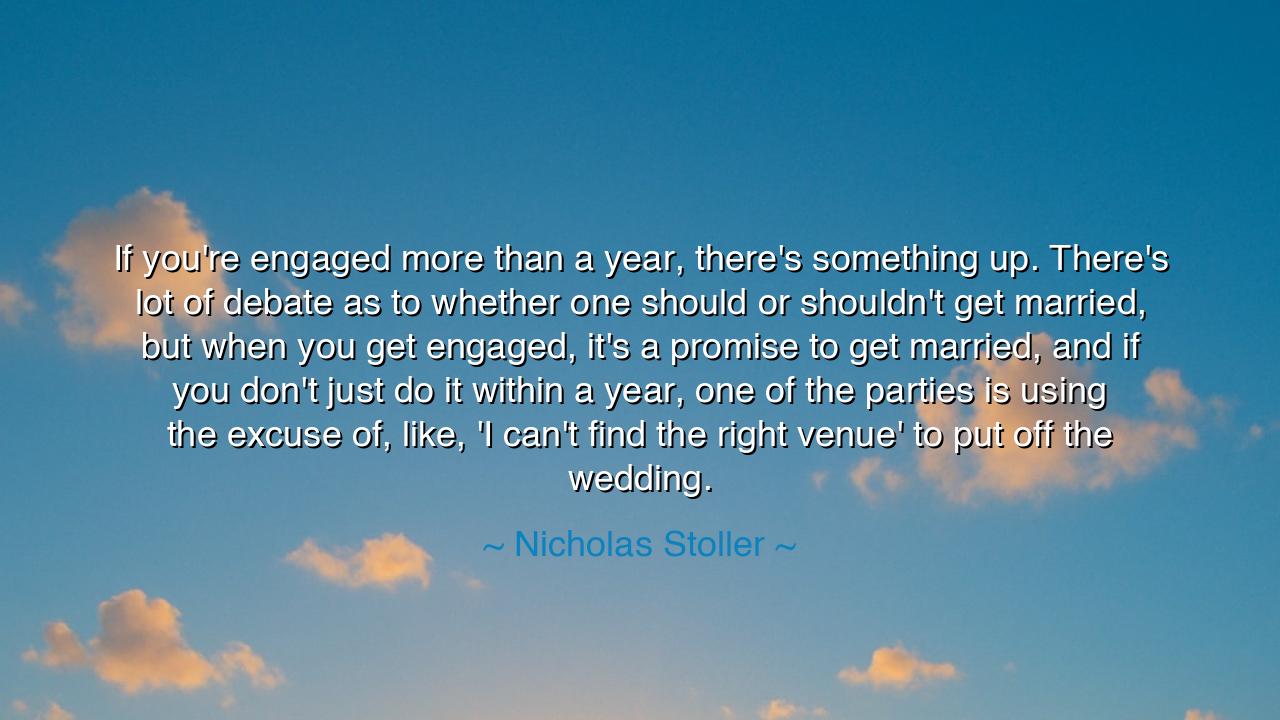
If you're engaged more than a year, there's something up.
If you're engaged more than a year, there's something up. There's lot of debate as to whether one should or shouldn't get married, but when you get engaged, it's a promise to get married, and if you don't just do it within a year, one of the parties is using the excuse of, like, 'I can't find the right venue' to put off the wedding.






In the words of Nicholas Stoller—“If you’re engaged more than a year, there’s something up. There’s a lot of debate as to whether one should or shouldn’t get married, but when you get engaged, it’s a promise to get married, and if you don’t just do it within a year, one of the parties is using the excuse of, like, ‘I can’t find the right venue’ to put off the wedding.”—we are confronted with the weight of engagement. It is not a trinket of romance, nor a gesture to be stretched into eternity, but a promise: a vow that points forward, demanding fulfillment. To linger too long in this state is to risk transforming a covenant into hesitation, and a vow into doubt.
The ancients knew the peril of delayed commitments. In the Roman world, an oath sworn before witnesses carried binding power. To defer its fulfillment was seen not as patience but as betrayal. The man who pledged service and withheld it, or the general who promised action but delayed, was judged unworthy. So too with engagement: once the promise is given, the time for endless waiting has passed. The bond must be sealed, or suspicion grows that the heart falters.
Stoller’s words pierce deeper still, for he unmasks the excuses that often cover fear or uncertainty. The search for the “perfect venue” or the “perfect time” may hide a deeper truth—that one heart is reluctant, unwilling to pass from promise into permanence. The ancients spoke of this in allegory: Penelope, though faithful, delayed her suitors by weaving and unweaving her tapestry. Her waiting was noble, for it guarded loyalty to Odysseus. Yet when delay is born not of loyalty but of hesitation, it becomes a shadow over the vow.
History itself offers warning. The Trojan War was ignited not by swift commitment but by wavering loyalties and broken promises. Paris and Helen’s bond, born of passion, lacked the swift seal of honor, and thus drew nations into ruin. Commitment delayed, or corrupted by doubt, becomes not a private matter but a storm that spreads outward, sowing strife in families and communities alike.
Thus, let us learn: an engagement is not meant to be endless, but to mark the passage from promise into action. To delay without cause weakens trust, to hide reluctance beneath excuses corrodes love. The wise know that vows are not meant to linger like mist—they are meant to become flesh and deed. For love grows strong not in hesitation, but in the courage to seal promise with action.






TBthai bao
Nicholas Stoller’s take on engagements lasting too long really challenges the notion of a 'timely' wedding. It’s interesting how society often places this expectation on couples to follow a set timeline. But what if the issue isn’t about avoiding marriage but rather about wanting the right circumstances? Could we be too quick to judge couples based on their timeline rather than understanding the unique dynamics of each relationship?
AAanh anh
I understand Nicholas Stoller’s view, but I’m not sure I entirely agree. There can be many reasons for a long engagement, and not all of them have to do with avoiding commitment. Maybe the couple is taking their time for practical reasons like finances, family situations, or personal growth. Should we really judge a couple’s intentions just based on the timing of their wedding? What’s the real harm in waiting if both parties are committed to each other?
A9Nguyen The Anh 9B
Nicholas Stoller’s comment about engagements lasting too long raises a valid point about the pressure of making promises and following through. But is it possible that some couples simply enjoy being engaged without rushing into marriage? Perhaps the delay is not about avoiding commitment but about wanting to make sure everything is perfect. Does this viewpoint risk oversimplifying the complexity of relationships, or is there a deeper issue of avoidance that needs to be addressed?
DBPhuong Dang Bich
This perspective really makes me think. Is there an unspoken rule that engagement should lead to marriage within a certain time frame? While I agree with the sentiment that an engagement is a promise to get married, I also think some couples might genuinely need more time to plan or sort out other aspects of their lives before tying the knot. Is a year really a reasonable expectation for everyone, or are there circumstances that make a longer engagement more acceptable?
NTNguyen Thiem
I see where Nicholas Stoller is coming from with his comment. When you’re engaged, it’s supposed to be a promise to commit to each other, so delaying the actual wedding might signal that there’s something holding the couple back. But does that always mean there’s a deeper issue, or could it just be a matter of life circumstances or other factors like finances or personal readiness? Should time really be the only factor in determining when to get married?